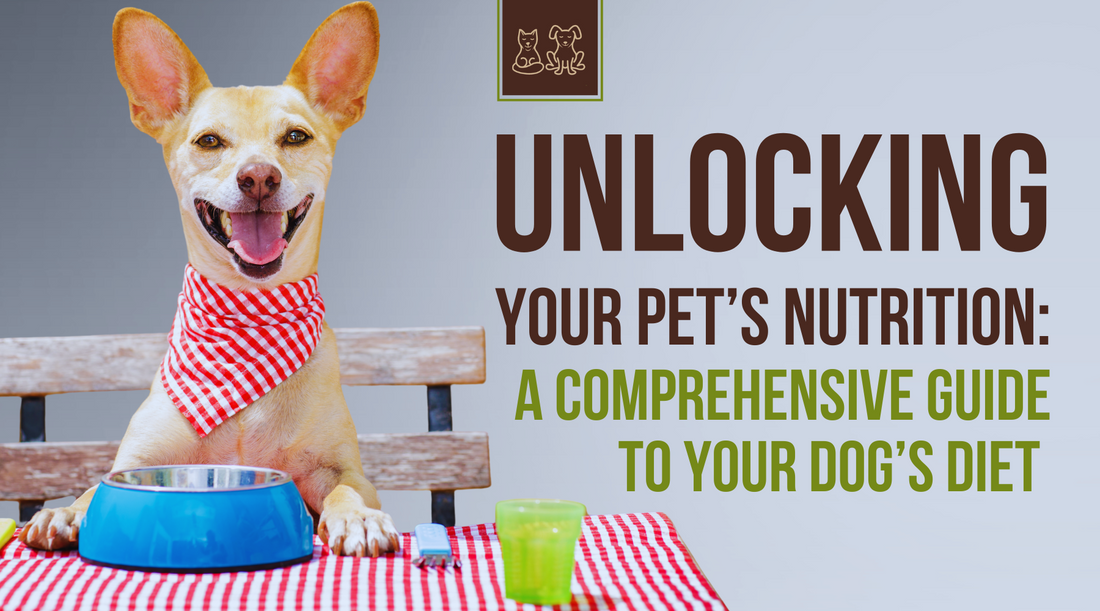Hey there, dog parents! Let's talk about what fills your furry friend's bowl. It's not just about satisfying their hunger; it's about ensuring they get the right balance of nutrients. Just like us, dogs need a mix of proteins, carbohydrates, fats, vitamins, and minerals to keep their tails wagging.

Protein Power: Fueling Your Furry Friend's Health
Proteins are like the unsung heroes in your dog's diet. They're not just about building muscle; they play a pivotal role in almost every aspect of your pooch's health. Let's break down why proteins are so crucial and how to ensure your dog is getting enough of the good stuff.
The Building Blocks of Life: Proteins are made up of amino acids, which are essential for building and repairing tissues. They're also key players in producing enzymes and hormones that keep your doggy's body running smoothly.
Animal vs. Plant-Based Proteins: Generally, dogs digest animal-based proteins like chicken, beef, and fish more efficiently than plant-based ones. That's because animal proteins are more complete, meaning they have all the essential amino acids your dog needs. But hey, that doesn't mean plant proteins don't have their place. They can still be part of a balanced diet, especially for dogs with specific meat allergies.
Quality Matters: Not all protein sources are created equal. The quality of protein in your dog's diet affects how well it can be utilized by their body. Look for named meat sources (like "chicken" or "beef") rather than vague terms like "meat meal" on dog food labels.
Tailoring to Life Stages: Puppies, adults, and senior dogs have different protein needs. Puppies, for example, need more protein to support their rapid growth, while seniors might need less quantity but higher quality protein to maintain muscle mass without straining their kidneys.

Special Diets for Special Needs: Some dogs, like athletes or those with certain health conditions, might need a special protein diet. Consulting with a vet to tailor the protein intake can make a huge difference in managing these conditions.
Watch Out for Excess: Just like with anything, too much protein can be a problem, especially for dogs with kidney issues. Balance is key!
FAQs on Protein in Your Dog's Diet
Q - How much protein should my dog have?
A - It varies, but generally, adult dogs need about 18% protein in their diet, while puppies might need 22% or more. Always check with your vet for specific recommendations.
Q - Can dogs be vegetarians?
A - Dogs can technically survive on a vegetarian diet, but it's challenging to ensure they get all the necessary nutrients. If you're considering this, consult with a vet or a canine nutritionist.
Protein is a powerhouse in your dog's diet, essential for everything from a wagging tail to a healthy heart. Remember, the key is balance and quality. Keep these protein tips in mind, and you'll be well on your way to supporting your furry friend's vibrant, healthy life!
Carbs for Energy: Fueling Your Dog's Playful Spirit
Carbohydrates often get a bad rap in the world of pet food, but they're an important part of your dog's diet. Let's take a closer look at why carbs matter and how to choose the right ones for your furry friend.
The Role of Carbohydrates: Carbs provide a quick source of energy. They're broken down into glucose, which fuels your dog's daily activities – from chasing squirrels to those intense tail-wagging sessions. Carbs also play a role in gut health, providing fiber that aids in digestion.
Types of Carbohydrates: There's a wide range of carbs out there. Whole grains like brown rice and oatmeal are great options, offering not just energy but also essential nutrients. On the other hand, some dogs might be sensitive to grains. For these pups, sources like sweet potatoes and peas can be excellent alternatives. 
The Fiber Factor: Fiber, a type of carbohydrate, is crucial for a healthy digestive system. It helps regulate bowel movements and can aid in managing weight. High-fiber foods include pumpkin, apples, and carrots. However, too much fiber can lead to tummy troubles, so balance is key.
Carbs and Weight Management: While carbs are necessary, it's important to balance them with other nutrients. Overfeeding carbs, especially in less active dogs, can lead to weight gain. Portion control and regular exercise are important to keep your dog in tip-top shape.
Choosing Quality Carbohydrates: Not all carbs are created equal. Avoid dog foods with fillers like corn and wheat gluten. Instead, look for foods with high-quality carbohydrate sources that provide energy and nutrients without empty calories.
Individual Needs Vary: Just like with protein, your dog's carb needs depend on their age, size, activity level, and health. Puppies and highly active dogs might need more carbs, while older or less active pups might need less.
FAQs on Carbohydrates in Your Dog's Diet
Q - Do all dogs need carbohydrates?
A - While dogs don't have a strict dietary requirement for carbs, they do provide beneficial energy and nutrients.
Q - Can dogs eat grain-free diets?
A - Yes, dogs can thrive on grain-free diets, but it's important to ensure they're still getting balanced nutrition from other sources.
Fats for Fitness: Unsung Hero of Your Dog's Diet
When we think of fats in our dog's diet, it's easy to jump to the idea of unhealthy weight gain. But hold your horses – or should I say, hold your hounds! Fats are incredibly important for your dog's health. Let's chew over why fats are essential and how to pick the right ones.
Essential Fatty Acids: Dogs can't make certain fatty acids on their own, so they must get them from their diet. These include Omega-3 and Omega-6 fatty acids, which are vital for a variety of bodily functions, including brain development, inflammation control, and maintaining healthy skin and a shiny coat.
Types of Fats: There are different types of fats, and each plays a unique role. Saturated fats, found in animal products, are a great energy source. Unsaturated fats, including Omega-3 and Omega-6, found in fish oil, hemp seed oil, and flaxseed, are crucial for overall health.
Balancing Act: The key to fats, as with any part of your dog's diet, is balance. Too much fat can lead to obesity and related health issues, but too little can result in a deficiency with its own set of problems. It's all about hitting that sweet spot.

Reading the Label: When choosing a dog food, look for one that specifies the type of fat used. Names like 'chicken fat' or 'salmon oil' are good signs. Avoid foods with generic terms like 'animal fat,' which can be a mix of various sources.
The Skinny on Fat Supplements: For some dogs, especially those with specific health conditions, supplements like fish oil can be beneficial. However, it's crucial to consult your vet before adding any supplements to your dog's diet.
Individual Needs: Like protein and carbs, the right amount of fat varies depending on your dog's life stage, breed, and activity level. For example, active and working dogs may need more fat for energy, while less active dogs may need less.
FAQs on Fats in Your Dog's Diet
Q - How much fat should my dog have in their diet?
A - A general guideline is that adult dog food should contain about 5-15% fat. But this can vary, so it's best to consult with your vet.
Q - Are all fats the same for dogs?
A - Not quite. Just like for humans, there are healthier fats (like Omega-3 and Omega-6 fatty acids) and less healthy ones (like certain saturated fats).
Vitamins and Minerals: Essential for Your Dog's Well-being
Just like us, our canine companions need a cocktail of vitamins and minerals to stay in tip-top shape. Let's dig into the role of these nutrients in your dog's diet.
Vital Vitamins: Each vitamin plays a unique role in your dog's health. For instance, Vitamin A is crucial for vision and immune health, while B vitamins are key for energy metabolism and maintaining a healthy nervous system. Vitamin D regulates calcium and phosphorus levels, supporting bone health.
Minerals Matter: Minerals like calcium, phosphorus, and potassium are fundamental for various bodily functions. Calcium and phosphorus keep your pup's bones strong, while minerals like sodium and chloride are important for nerve and muscle function.
Balanced Diet is Key: Most high-quality commercial dog foods are formulated to provide these essential vitamins and minerals. However, if you're going homemade or your dog has specific health issues, supplements might be necessary. Always chat with your vet before adding supplements to your dog's diet.
Watch for Deficiencies: Signs of vitamin and mineral deficiencies can vary. Poor coat quality, loss of appetite, or lethargy could indicate a problem. On the flip side, too much of certain vitamins or minerals can be harmful, so balance is crucial.
Mellow Mammals CBD: A Supplement for Your Dog
CBD products, like those from Mellow Mammals, are becoming increasingly popular for pet wellness. Here's a scoop on what they offer:
-
THC-Free Products: Mellow Mammals focuses on THC-free CBD products, ensuring your dog's safety. Dogs are highly sensitive to THC, which can cause negative reactions, so THC-free products are the way to go.
-
Potential Benefits: Many dog owners use CBD to help calm their dogs during stressful situations, such as thunderstorms or fireworks. It's also being explored for relief from joint pain, anxiety, and inflammation.
-
Quality and Safety: Mellow Mammals emphasizes quality, with patented glass bottles to block harmful UV rays and airtight dropper seals. They also perform full panel lab tests on every batch for potency, heavy metals, pesticides, mycotoxins, and terpenes, prioritizing your dog's health.
-
Choosing the Right Product: The effectiveness of CBD can depend on factors like your dog's weight, metabolism, diet, and age. Oil tinctures typically absorb faster than treats and allow more precise dosing.
-
Dosage Recommendations: Mellow Mammals suggests starting with a dosage of 0.2mg per pound of your dog's body weight, adjusting as necessary. Keeping a diary of dosages, effects, and adjustments is recommended for finding the ideal amount.
-
Consult Your Vet: Before starting any new supplement like CBD, it's important to discuss it with your veterinarian, especially if your dog has existing health issues or is on other medications.

